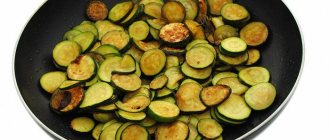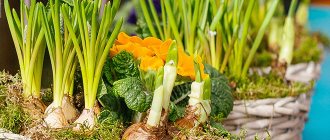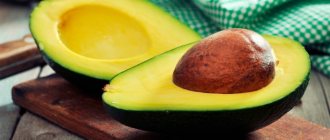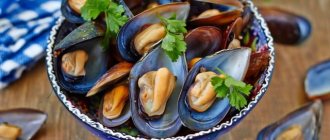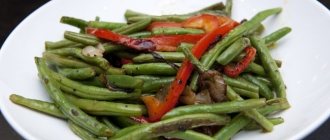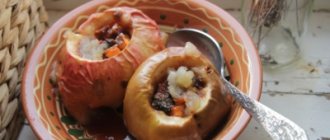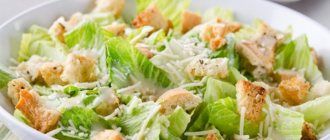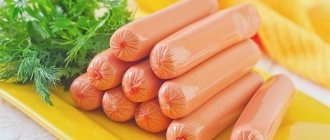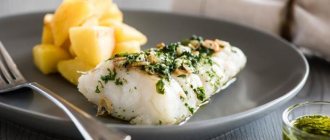Pancakes are a delicious and filling food that makes an excellent main course or dessert. After giving birth, women ask whether a nursing mother can have pancakes. Doctors do not classify pancakes as prohibited foods during breastfeeding. However, you should eat such food very carefully.
It is necessary to prepare the dish correctly and follow the rules of consumption. Remember that an overdose of even the healthiest product can lead to allergies or digestive disorders in the baby. In addition, excess amounts of pancakes will increase mom's weight.
To avoid excess weight and health problems for your baby, adhere to the nutritional standards of a nursing mother. Pancakes should be introduced into the diet no earlier than three months after childbirth. In the first months, the baby’s body is very weak and will not be able to accept such food.
The first time you try it, eat a small piece of pancakes or pancakes. Observe your baby's reaction for two days. If there is no rash or colic, then you can increase the dose. But eat no more than 2-3 pancakes at one meal!
What time should a nursing mother start trying pancakes?
If pancakes are allowed during lactation, then only in small quantities and properly prepared. Indeed, during such a crucial period, excesses of any, even relatively safe, ingredient can provoke allergies or digestive problems in infants. In addition, they can negatively affect the figure of a nursing mother.
To prevent weight gain or unpleasant consequences for the baby, pancakes during breastfeeding should be eaten quite carefully and in accordance with nutritional standards for nursing mothers. Immediately after discharge from the maternity hospital, the baby’s body is not yet strong enough, so pancakes will have to be excluded when breastfeeding in the first month after the baby’s birth.
You can start testing them after the third month of the baby’s life.
You need to start introducing a new dish by analogy with all the other ingredients: on the first day, allow only a small piece of pancake, then wait two or three days and watch the baby. And only when the baby does not have a rash or colic, you can continue to eat the sweet dessert. But you shouldn’t overeat; you can eat no more than three pancakes.
Healthy and quick recipes
To prepare dietary and tasty baked goods, recipes from ordinary products are used. You need to remember the need for whole grain flour and replacing sugar with stevia and fructose in the same quantities.
Pizza for a nursing mother
For dough without eggs and yeast you need to take:
- flour – 2 cups;
- baking powder - half a teaspoon;
- salt – half a coffee spoon (a quarter of a teaspoon);
- kefir – 0.5 liters.
Room temperature kefir and salt are stirred. Gradually add flour with baking powder and rub thoroughly so that there are no lumps. You can speed up this process using a mixer. Pour the batter into a greased pan and let it sit for about 15 minutes until bubbles appear on the surface.
Bake at 200 degrees for 20 minutes. Readiness is checked with a match - it should remain dry if you pierce the pizza base with it. For the filling, take boiled chicken, cheese, peeled tomatoes, slices of zucchini or sour apples. When serving, pizza must be sprinkled with fresh herbs.
Recipe for delicious apple pie without sugar
Apple pie for a mother who is breastfeeding consists of the following ingredients:
- flour – 300 g;
- baking soda or baking powder – 5 g;
- butter – 75 g;
- egg - 1 piece;
- sweet apples – 3 medium size;
- cottage cheese 5% fat – 150 g.
First, mix the cottage cheese with the egg and soft butter, grind well until completely smooth with a spoon or mixer. Add flour with soda or baking powder in parts. As a result, the dough is thick, dense, but elastic.
Pour the cake mixture into a silicone or other greased mold and place thinly sliced peeled apple slices on top. They can be sprinkled with a small amount of cinnamon (about 3 g) for flavor. The pie should be baked at 200 degrees for 30-35 minutes. In the last 10 minutes, if possible, turn on the top burner to thoroughly bake the apples.
Pancakes without eggs and milk
If you are intolerant to eggs, use Lenten recipes or replace them in any recipe at the rate of one egg per 50 g of apple or pumpkin puree, half a banana. Instead of one egg, they also use ground flax grains - mix a tablespoon with 30 ml of hot water and leave for 10-15 minutes. You can beat a teaspoon of vegetable oil with 2 tablespoons of water and a tablespoon of baking powder.
For lean pancakes you will need:
- flour - one glass;
- sugar (fructose) – a tablespoon or 2 tablets of stevia;
- salt - a third of a teaspoon;
- baking powder - half a teaspoon;
- vegetable oil (preferably with a slight odor) – 50 g.
First, salt and sugar are dissolved in water, and then sifted flour and baking powder are added. Stir until completely homogeneous and add oil at the end. Pancakes are baked in a frying pan without oil, if it has a special coating, or greased with a thin layer (you can cut a potato) only for the first time.
Charlotte for a nursing mother with apples and dried apricots
For the test you need to take:
- flour - one glass;
- kefir – one glass;
- semolina - one glass;
- sugar – 4 tablespoons;
- vegetable oil - half a glass;
- baking powder – 5 g;
- salt – 3 g.
For the filling you will need 800 g of apples and 50 g of dried apricots steamed with boiling water for an hour. First, sift the flour and mix it with sugar, salt, baking powder and semolina. Then add vegetable oil, kefir, and knead the dough. Lastly, add finely chopped dried apricots and apple cubes (slices). The mold should be greased with oil and sprinkled with semolina. Bake for about 45 minutes at 180 degrees.
Diet cheesecake with oat flakes
To prepare the base, mix 100 g of rolled oats and 70 g of flour, add 100 g of cottage cheese with 5% fat content and 2 tablespoons of starch dissolved in half a glass of water. You should get a dense but elastic mass, which is placed in a greased mold. Form the bottom and sides and bake for 15 minutes.
For the curd layer, 500 g of cottage cheese is mixed with yogurt. It is added gradually to obtain a thick curd paste, so the amount of yogurt can be from 100 to 150 g. Taste and, if necessary, additionally use sugar or its substitute, cinnamon and vanilla on the tip of a knife.
Cool the cheesecake base slightly without removing it from the mold, and spread the curd mass. Then place in the refrigerator for 4-6 hours. When serving, you can pour jam or syrup on top and place bananas on top.
What's better to eat pancakes with during wartime?
The nutrition of a nursing woman is not limited to the norms and recommendations about the required portion. It is important to follow the rules for preparing healthy dishes. Since, for example, fatty pancakes will be harmful to the baby’s digestive system and the mother’s figure. Therefore, you should adhere to some rules:
- no need to use fat, it is better to fry in vegetable oil;
- the dough should be prepared with whey, curdled milk, kefir, milk with the lowest percentage of fat content or just water, or the milk should be diluted with water;
- flour can be partially replaced with ground oatmeal, approximately 1/2 of the total amount of flour. Pancakes prepared using this dough are healthier and easier to digest;
- if you combine the usual flour with barley, the resulting pancakes will be useful for the functioning of the cardiovascular system;
- You need to exclude sugar and yeast from the cooking recipe.
You need to carefully choose the filling for pancakes during breastfeeding in order to make them healthier, not more harmful.
To make the dish more nutritious, pancakes can be prepared with filling. But it is better not to use sweet, fatty or very heavy fillings, that is, you need to exclude fried mushrooms, minced meat and condensed milk. Moreover, you need to be careful when using ingredients that can lead to an allergic reaction, such as honey. From the permitted products for filling, choose:
- low fat cottage cheese;
- blackcurrant or blueberry jam;
- pieces of dried fruit and seasonal berries, but not bright colors;
- boiled egg;
- fresh vegetables or with sour cream;
- red varieties of fish;
- cheese, but not fatty;
- boiled meat;
- boiled potatoes;
- pureed fruit, such as apple or banana.
With filling, a nursing mother is allowed to eat only two pancakes; without it, she can eat three. But not every day.
Benefit
Gone are the days when pediatricians tried to put all young mothers on a strict diet of buckwheat and chicken broth. Modern experts say: a nursing mother can eat anything. Western obstetricians even advise bringing chocolate, fresh fruit and other foods that have been banned for a long time to the maternity hospital. What can we say about pancakes - a simple dish that is on every person’s table at least once a year.
Pancakes are a healthy dish, the merits of which can be discussed for quite a long time. For women during lactation, the following points are important:
- like any tasty food, pancakes contribute to a good mood;
- contain carbohydrates that allow you to quickly replenish energy loss;
- saturates well even in small portions;
- prepared with milk, contain a large amount of calcium - an important microelement necessary for every nursing mother.
How to choose ingredients for making pancakes
The main components of a tasty dish are liquid and flour. Careful attention must be paid to the selection of even such simple ingredients for breastfeeding so as not to harm the baby.
You should not look for premium flour; it is better to choose a composition with corn or rye flour. Pancake flour is also sold separately. It includes 20 percent rye and buckwheat flour and 60 percent wheat. You can also make your own flour by adding flakes or barley.
Of all the liquids, it is better to choose water or whey, which, in addition to the original taste, will also bring benefits to the body.
Milk, on the one hand, is healthy due to its calcium content, but on the other hand, it is dangerous, as it is considered an allergenic product that can cause rashes, itching or redness on the skin. Therefore, if a young mother prefers milk for a pancake recipe, then you should use only skim milk or replace animal milk with vegetable milk.
Almost all housewives use eggs in their pancake batter recipe; if you are pregnant, it is better to use quail eggs. They will have a beneficial effect on the further development of the child, and a dish with their addition will acquire a beautiful color.
How to make pancakes with kefir?
Many people prefer a more fluffy version of pancakes, so we decided to include a recipe for healthy, harmless and very appetizing pancakes. For kefir pancakes you need to take:
- flour – 2-3 cups;
- kefir – half a glass;
- eggs – 2 pieces;
- vanilla sugar;
- add regular sugar and salt to your taste;
- a little soda or prepared baking powder;
- oil for frying.
- Salt the pre-washed raw eggs and beat thoroughly (with a whisk or fork). Add sugar and knead again.
- Cool the kefir to room temperature in advance or heat it in a water bath. Pour it into the resulting egg mass in a thin stream.
- Sift the flour and pour into the prepared liquid mass. Mix everything. The consistency of the dough should be jelly-like.
- Take a frying pan with a thick bottom and heat it over medium heat.
- Scoop the dough into a tablespoon and pour it into the pan. Make sure the pancakes are not touching each other to prevent them from sticking together. Fry for 2-3 minutes on each side.
- Remove excess fat by placing the pancakes on a paper towel or napkins. Sprinkle finished products with sour cream before serving.
Source of the article: https://vseprorebenka.ru/laktaciya/pitanie-mamy/mozhno-li-kormyashchej-mame-bliny.html
Water-based pancakes for a woman breastfeeding her baby
The optimal recipe for a delicious dessert for nursing, safe for both baby and mother, is as follows. Products you will need:
- 700 ml mineral sparkling water.
- 350 g flour flour.
- A pinch of salt.
- 2 tbsp. vegetable oil.
- Sugar as desired and to taste
Mix flour with salt and pour in mineral water. Mix the mixture thoroughly, add vegetable oil and mix again. Bake pancakes in a hot frying pan.
Pancakes are allowed for breastfeeding, but only in small quantities and from the right ingredients. Only in this case, pancakes will not harm the baby and will help the mother diversify her menu with a delicious dessert.
How to cook harmless but tasty pancakes?
Realizing that it is difficult for you to give up your favorite baked goods, you can sometimes cook them, but keep in mind that your food also affects your baby. A few tips will help you prepare a safe dish:
- Cook in a Teflon pan that requires no oil for frying. When cooking in a cast iron pan, do not pour oil on it, but lightly grease the pan with a brush.
- Use low-fat products (whey, yogurt, milk, boiled water) to dilute the dough.
- Cook not with wheat flour, but with barley flour or oatmeal.
- Avoid sugar and sweeten the dough with honey if your child is not allergic to it.
- Knead the dough without using yeast. Remember that yeast causes colic.
Cooking pancakes in a frying pan without adding oil will reduce the harm from the product to a minimum, which is very important for the body of a newborn
Fillings
The meat filling along with sautéed onions will be very tasty. Mix the boiled meat and onions using a blender. Place the filling in the center of the pancake and roll it up.
If the filling seems too dry to you, you should add a little rast to it. oils Be sure to salt the mixture to your liking.
These pancakes will be very filling. A nursing mother can eat any meat. I only advise you to give preference to low-fat. These pancakes can be easily made for future use and frozen to be subsequently reheated in a microwave oven.
Potato filling for pancakes can be safely used as a snack or as a substitute for a main course.
I put sauteed onions in mashed potatoes, you can also add other vegetables. Chopped liver and meat for mashed potatoes are also an excellent addition to potatoes.
The curd filling is very healthy. Cottage cheese contains protein and calcium. These pancakes will be delicious, both sweet and savory. Cottage cheese can be mixed with parsley, dill, green onions, and grated egg.
If you want something sweet, add raisins, dried apricots, dried fruits and candied fruits to it. In general, feel free to experiment.
Sweet banana filling is an excellent solution even for children over 1 year old. A couple of tbsp. cream and puree from 2 pcs. bananas need to be mixed and put in pancakes. Such a treat will not only be satisfying, but also nutritious.
Plus, pancakes with warm fillings are very popular. You can find such variations in various modern cafes, the range of which includes pizzas.
In this case, you need to use baked or boiled meat, ham, and chicken. eggs, cheese, herbs or vegetables. Place the filling in the pancake and sprinkle with grated cheese.
Then roll it up and put it in the oven for a few minutes. If you have a microwave at home, then it’s even easier, because at maximum power it takes 40-60 seconds. it will be enough for the pancakes to be ready.
It’s also worth trying to make a delicious sauce for pancakes. In this case, you need to take low-fat sour cream and mix it with chopped herbs. It will turn out very tasty, don’t even doubt it.
Try different recipes, but always look at your baby’s reactions, and in the best case, you should consult your doctor, so that you don’t regret later that you ate something harmful to your baby.
Liquid
The quality and taste of the finished product depends on the type of liquid in which the flour base was diluted. The safest is water, pure drinking or mineral.
Tender, tasty and soft pancakes are obtained if milk, kefir or whey is added to the flour.
The use of dairy products allows you to saturate the body with calcium, which is necessary for the mother to replenish the reserves of the microelement in the body, and for the child to grow and strengthen bones. The elements necessary for full lactation are washed out of a woman’s body; with insufficient nutrition, teeth, skin and hair will suffer.
Lactose intolerance is a problem for many children. To reduce the risk of allergies, it is necessary to dilute milk with water when preparing pancakes.
When using yogurt or kefir, the risk of developing allergies is significantly reduced, pancakes become fluffy, have a pleasant taste and do not go stale for a long time. A small amount of alcohol in kefir allows pancakes based on it to absorb less fat when frying.
Possible harm of baked milk
When consuming baked milk, there is a fairly high risk of food allergies. It most often manifests itself in the form of a rash on the body and skin itching, nausea and vomiting. Abdominal pain and abnormal bowel movements (diarrhea or constipation), nasal congestion and tearing, irritation and redness of the eyes may appear.
Sometimes there is difficulty breathing, internal swelling of the respiratory organs and tracts. In this case, it is the internal swelling of the organs that is most dangerous. If signs of food allergy or poisoning appear, exclude the product from the baby’s menu and consult a doctor.
In addition, spoiled milk or a product that contains preservatives and other chemicals is dangerous. This can lead to severe poisoning, fermentation processes in the body and intestinal infections.
Do not forget that the baked drink contains a large amount of fat and is an extremely high-calorie product. Therefore, it is not recommended if you are overweight.
What's useful
Energy is needed to maintain the functioning of the entire body. One of the sources of which is food.
For the benefit of the maternal and child's body, food should be rich in essential vitamins and microelements.
The maximum amount of energy comes from so-called slow carbohydrates. Their source is cereals. For example, the well-known oatmeal.
Unlike slow carbohydrates, fast carbohydrates, found in sugar and other sweets, are quickly absorbed by the body, as a result of which the feeling of hunger comes faster. Thus, many familiar dishes pose a threat to my mother’s slimness.
When and how should you introduce your baby to fermented milk products?
Parents often ask what foods should be among the first to be given to their infants as complementary foods. If there are no contraindications, I recommend kefir. It improves immunity and normalizes intestinal microflora. The product is easily digestible and rarely provokes allergies. Nursing women should also drink it regularly.
Kefir is bifidobacteria and lactobacilli that normalize intestinal microflora, vitamins and microelements responsible for the harmonious development of infants, iodine and folic acid, necessary for the formation of the nervous system.
Pediatricians advise introducing the product into a baby’s diet from the 8th month of life (artificial babies receive the first portions of fermented milk at 6-7 months).
Complementary feeding with an essential source of protein should be started with 30 ml, gradually increasing the dose to 200 ml. At 9 months, this portion can replace one meal.
